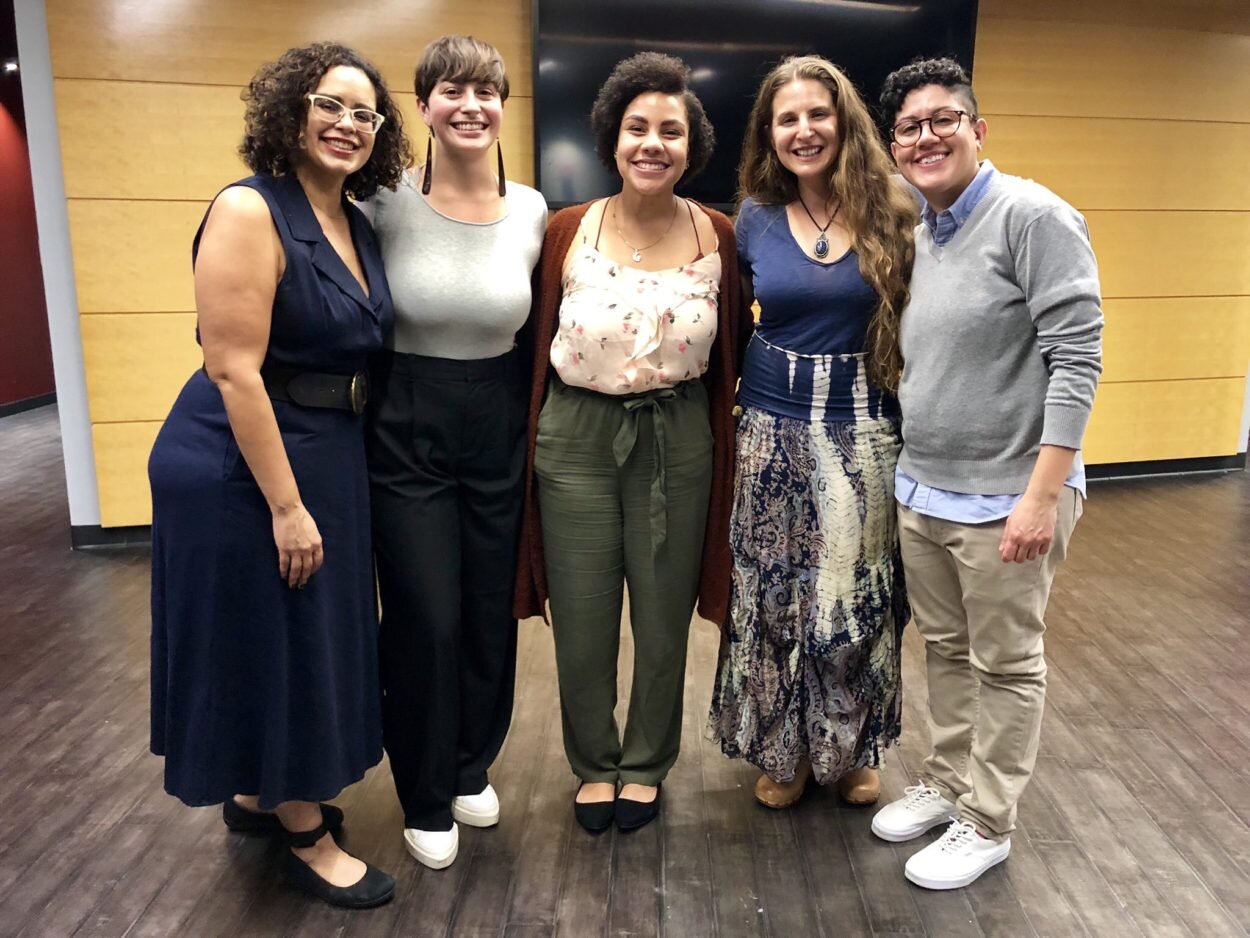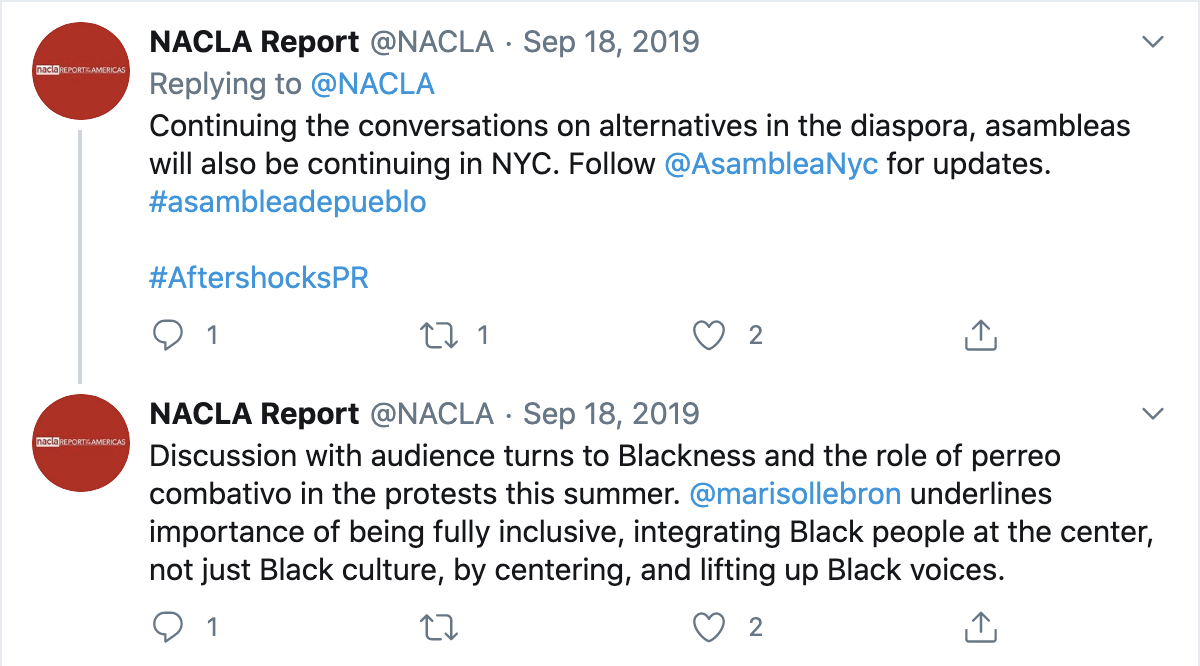Aftershocks of Disaster is an in-depth look at Puerto Rico in the aftermath of Hurricane Maria and the preexisting crisis that conditioned this historic disaster. The concept of “aftershocks” is used in the context of earthquakes to describe the jolts felt after the initial quake, but no disaster is a singular event. Aftershocks of Disaster examines the lasting effects of Hurricane Maria, not just the effects of the wind or the rain, but delving into what followed: state failure, social abandonment, capitalization on human misery, and the collective trauma produced by the botched response.
Aftershock’s editors Marisol LeBrón and Yarimar Bonilla will be in conversation with Alana Casanova-Burgess of WNYC’s On the Media.
Marisol LeBrón is an interdisciplinary scholar specializing in race, policing, and political activism in Puerto Rico and U.S. communities of color. She is an Assistant Professor of Mexican American and Latina/o Studies at the University of Texas at Austin. She is the author of Policing Life and Death: Race, Violence, and Resistance in Puerto Rico and, along with Yarimar Bonilla, co-editor of Aftershocks of Disaster: Puerto Rico Before and After the Storm. LeBrón is also one of the co-creators of the Puerto Rico Syllabus, a digital resource for understanding the Puerto Rican debt crisis.
Yarimar Bonilla is a political anthropologist specializing in questions of sovereignty, citizenship, and race across the Americas. She has tracked these issues across a broad range of sites and practices such as postcolonial politics in the French Caribbean, the role of digital protest in the Black Lives Matter movement, the politics of the Trump presidency, the Puerto Rican statehood movement, and her current research -for which she was named a 2018 Carnegie Fellow- on the political, economic, and social aftermath of Hurricane Maria in Puerto Rico.
Alana Casanova-Burgess is a radio journalist and producer for The WNYC show On The Media. She has conducted on the ground in Puerto Rico for The WNYC newsroom, culminating in a special episode of On the Media devoted to Hurricane Maria in 2017 and coverage of the 2019 #RickyRenuncia protests. Her work has been recognized by The ONA, PRNDI, and The Council on Contemporary Families. She is a bilingual native New Yorker with roots in The Dominican Republic, Puerto Rico, and the CUNY Graduate School of Journalism.
Event Recap
On September 18, The Latinx Project hosted our first official event of the Fall semester: a book launch for Yarimar Bonilla and Marisol LeBrón, co-editors of the new anthology, Aftershocks of Disaster: Puerto Rico Before and the Storm. They were joined by Alana Casanova-Burgess of WNYC’s On the Media, who opened the conversation with a comment on the varied content found in the book’s five sections, which includes contributions from writers, scholars, journalists, poets, visual artists, photographers, and theater performers.
Marisol LeBrón quickly underscored the importance of “thinking about alternatives” with regard to the issues confronting Puerto Rico, from scholarly critique to artistic expression. “Art and the work of activists became super important for trying to think through those alternatives,” added LeBrón. Creativity and resistance, moreover, go toward showcasing the experiences of Puerto Ricans on and off the Island in the two years after Hurricane Maria. Though as Yarimar Bonilla pointed out and the subtitle of the book suggests, “aftershocks,” which are associated with earthquakes rather than hurricanes, is still a concept open to interpretation, making the anthology relevant in numerous contexts, such as the ongoing debt crisis and the colonial systems in place before the storm.
Next, Casanova-Burgess shifted the conversation to climate change by framing her questions around the global climate strike set to begin on Friday, September 20—the two-year anniversary of Hurricane Maria’s landfall in Puerto Rico. Bonilla explained that this year feels like the first real anniversary for Puerto Ricans given the circumstances one year after the storm. In terms of climate change, the discussion revolved around problematizing terms like disaster, crisis, and catastrophe. “To what extent is there a new crisis, or is this a realization of the crisis that Puerto Rico has been experiencing for a long time?” asked Bonilla, as the conversation delved into the coloniality of disaster.
Resilience, another word to gain prominence in the Puerto Rican lexicon according to Bonilla, must also be thought of critically. “Resilience is not what we should be asking of people in a disastrous situation,” remarked Casanova-Burgess. LeBrón then added that the discourse of resiliency abdicates the state of responsibility and creates an excuse for populations to withstand violence—a dynamic that is central to neoliberalism. Meanwhile, disaster capitalism becomes a development model parallel to this bureaucratic neglect.
On the other hand, as Bonilla noted, the recognition of individual and collective capacity played a key role in the protests that removed Governor Ricardo Rosselló from power. More importantly, this shift in consciousness sets the stage for not just a return to normalcy in Puerto Rico, but the potential for radical change.
What comes next, however, remains to be seen. “This is a moment of possibility, which is also a moment of uncertainty,” observed Bonilla. LeBrón, in turn, warned of the tensions between the status quo and emerging social movements: “Moments of upheaval break this open for everyone—those on the ground fighting for change, and for the elites to re-grab power.” Regardless, the first step appears to be the asambleas that have been hosted across the Island and throughout the mainland diaspora. “The people really needed to see that they could come together and achieve a goal; now is the messy part,” concluded Bonilla.
During the Question and Answer portion of the event, the conversation lingered on the question of identity, specifically the decentralization of whiteness in favor of uplifting Afro-Puertorriqueñidad. This inclusion, especially among the youth, also extends to feminist and queer identity, which was central to the protests against Governor Rosselló. Perreo combativo, a subject explored by LeBrón and Verónica Dávila, was an example of this inclusive, youthful organizing principle in Puerto Rico. *The perreo section of the program was unfortunately cut for time.
Above all, a sense of urgency, said Bonilla, helped shape the Aftershocks anthology and the many issues brought up in conversation. “I remain hopeful, which is new to me,” says Bonilla.





